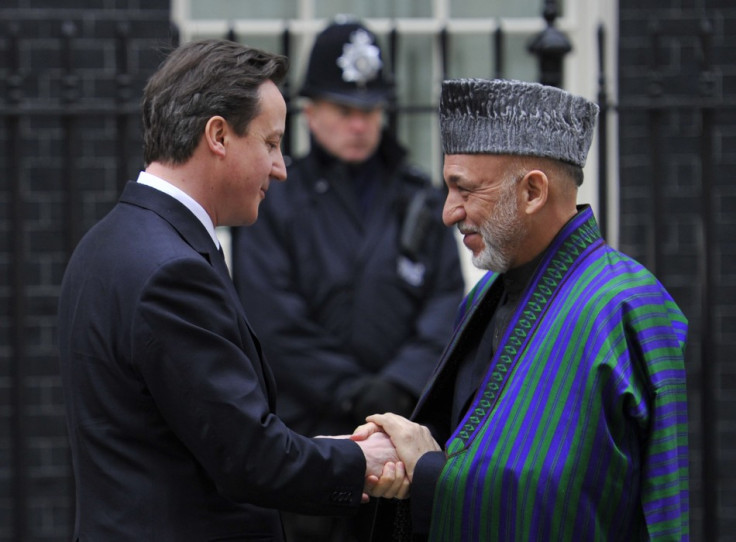Afghanistan: David Cameron hints at an early withdrawal of British troops

Last week, the Daily Telegraph revealed that David Cameron has ordered British commanders to draw up plans to start pulling hundreds of British troops out of Afghanistan within weeks, triggering a row with military chiefs who do not approve of the Prime Minister's new strategy.
Mr Cameron had previously declared that Britain's combat mission in Afghanistan must end by 2014, pre-empting the need for an early removal of the troops. It seems that the killing of Osama bin Laden in Pakistan may have impacted on the Prime minister's view of what policy the government should apply with regards to Afghanistan by increasing a sense of urgency about ending the Afghan mission The plan is apparently to start the removal of troops by this summer, at the same time the US will start reducing its troop numbers.
The main argument against Cameron's decision is driven by the fear that a premature removal of British troops could highly hinder the counter-insurgency mission led in Afghanistan, thus enhancing the Taliban's influence throughout the country. Detractors regret that Cameron's decision seems to be more political than strategic. In addition to Bin Laden's death, the number of British troops deaths in Afghanistan, which amount to 364, have also played a key role. Since the beginning of the operation in 2001, public opinion and support for the mission has decreased considerably as the British death toll increased.
According to Whitehall sources however, defence chiefs, led by Gen Sir David Richards, the Chief of the Defence Staff, are determined to challenge Mr Cameron's calls to reduce the size of the current deployment, insisting on the need for troop density not to be reduced.
The divergence of opinion between Cameron and the defence chiefs will mostly lead to the deference of a possible withdrawal as a consensus must first be reached. A way the chiefs would be willing to compromise is to see how the reduction of British personnel could focus on cooks or administrative personnel rather than on the combat force itself.
Meanwhile in the US, senior American military figures have warned Britain that a hasty exit from Afghanistan could strain relations between the two countries as at a time when American generals are fighting increasing political pressure to reduce US troop numbers, the prospect of an imminent British withdrawal is certainly not perceived as good news.
Confirming that a debate is taking place behind the scenes, a senior Whitehall official said: "There is a very active conversation going on. On the one side there is the military concern about force density and continuing the mission, and on the other side is the PM's political imperative for some sort of announcement on draw-down."
Whenever the removal of British troops starts, it seems clear for now that all deployed personnel will have left Afghanistan by 2014 at the latest.
An MoD spokesman confirmed: "President Karzai announced in March that the first phase of security transition in Afghanistan has started. This begins the process of a gradual transition which will be completed across the country by the end of 2014.As the Prime Minister, Defence Secretary, and Chief of Defence Staff have said, troop reductions maybe possible in 2011 but no decisions have yet been taken. UK forces will no longer be in a combat role or in the present numbers in Afghanistan by 2015."
British involvement and strategy in Afghanistan: the facts
British forces took part in the invasion of Afghanistan alongside other forces in the US-led coalition following the 9/11 attacks. The first British troops were deployed in November 2001. At the beginning of the operation the main British aims were to destroy terrorist infrastructure, and to stop the movement of Al-Qaeda in the eastern part of the country with the objective of completely annihilating its Afghan base, while "support[ing] the development of a new country able to take its place within the International community."
In reality however, after the Taliban regime was toppled, it seems that the troops were first forced to focus on providing security in and around the capital, Kabul. Another important phase in the British mission was the deployment of troops, as part of NATO's mission in the Helmand province, in the southern part of the country. Its mission was to focus on a governance and economic development plan. The governance phase consisted in establishing a direct relationship between the central government and the people from the province, while the economic phase aimed at furthering job opportunities. Taking control of the province proved particularly difficult as a lack of personnel and equipment interfered with the troop's ability to control the increasing insurgency. The military publicly blamed the Labour government for not deploying enough materiel and personnel. In 2008 the 'Helmand road map" announced a change of tactics: the operations were now intended to focus on smaller areas, which were called "Afghan development zones", and which aimed to allow troops to focus on particular areas rather than try to spread their influence over the province. The operation also suffered a number of set-backs and in spring 2010 Operation Moshtarak II was launched.
The last ten years have definitely proven that the situation on the ground in Afghanistan is much more complex than first assumed. In March 2011, a UN report pointed to a 15 per cent rise in the death toll last year and urged greater efforts by all parties to protect civilians. With such gloomy reports in mind, a lack of literacy, widespread corruption and poverty it seems very optimistic to think that by 2015 Afghanistan will finally be able to take its place within the international community.
© Copyright IBTimes 2024. All rights reserved.





